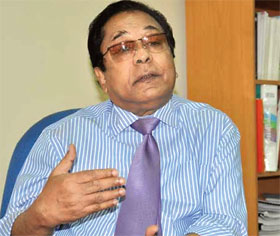'Public policy for business leaders'
By Gamini Warushamana
Director, Public Policy of the Postgraduate Institute of Management
(PIM) Prof. Lloyd Fernando said that the private sector needs to
understand public policies for an effective public-private partnership
that is the driving force of the economy today.
|

Prof. Lloyd Fernando |
Prof Fernando was speaking on the short-term learning and knowledge
sharing course launched by PIM on 'Public Policy for Business Leaders'.
He said that success in competitive business is strongly linked to
the f firms to learn from the past, comprehend the present and read the
future. What often prevents success is the lack of application.
The business environment is principally determined by government
policies. The successful firm converts challenges posed by rules,
regulations, procedures and policies on interest rates, exchange rates,
taxes, subsidies and government expenditure into opportunities for
success.
Following are excerpts of the interview:
Ours is a mixed economy where the private sector plays a bigger role
in the production of goods and services. It accounts for nearly 80
percent of the goods and services produced in the country.
Therefore, the private sector is considered as the engine of growth.
However, this engine is driven by the government.
In today's global context, except for a few countries such as Cuba,
North Korea, the role of the government in economic management is
similar.
Even in socialist economies such as China and Vietnam, the private
sector's role in the economy is bigger and the role of the government
has changed.
Economic activities are concentrated in the private sector and the
role of the government is to provide guidance, facilitation and enforce
regulations.
Today in Sri Lanka the public policy framework is the Mahinda
Chintana. The framework gives guidelines as to where the private sector
should be and the objectives of the government.
The Government also expects fair play from the private sector. To
ensure that no monopolies or cartels are formed, it dictates rules and
regulations to avoid market distortions and safeguards the interests of
the people. The Government can also request the private sector to
produce the right kind of goods and services to protect the interests of
the consumers.
Therefore regulations have a meaning in a mixed economy. Government
must be a facilitator that provides a conducive economic environment for
the private sector. The government does this mainly by macroeconomic
policies such as fiscal policy, monitory policy, international trade
policy, balance of payment policy and exchange rate policy.
So the private sector needs to have a better understanding of these
policies for an effective partnership between the private sector and the
government. This course launched by PIM essentially supports effective
public-private partnership by providing a better understanding of public
policies to the leaders in the private sector. With this knowledge
leaders in the private sector will be able to incorporate their ides in
public policies and make their business strategies within the business
environment that has been created by such policies.
This course is structured in a way that participants get a good
understanding of the government's macroeconomic policies and internal
and international investment climate.
The course is conducted by qualified and recognised resource persons.
Since this is a program designed for senior managers in the private
sector it is not a traditional classroom style course and it is an
interactive learning process that enables the participants to share
their experiences.
This course enables the private sector to optimise the opportunity
given by the government to submit proposals for the budget.
The government will soon start the 2014 pre-budget cluster
discussions and the business community will be provided an opportunity
to express their views. Normally the private sector expects various
concessions including tax relief at the budget and with proper knowledge
on the real issues such as budget deficit, BoP crisis that underlines
the objectives of the government policies they will effectively
participate in these discussions. This course is unique, since it is
aimed at decision makers - CEOs, divisional heads, strategic planners
and members of executive boards. It emulates the success of countries
such as Singapore and Korea which require business leaders and senior
politicians to annually follow several hours of training in reputed
universities.
It will bring together a forum of some of the best academics and
researchers who will engage the participants in a lively learning
experience. It will not teach but facilitate absorption of knowledge
through self effort by placing before them learning material and
opportunity for individual consultation with specialists. |


